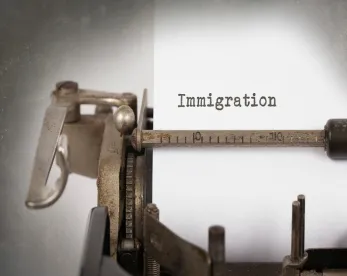On March 3, 2017, U.S. Citizenship and Immigration Services (USCIS) unexpectedly announced that it will temporarily suspend its premium processing service for all H-1B petitions received on or after April 3, 2017. The premium processing program allows a petitioner to receive a decision on its case within 15 calendar days upon payment of an additional government filing fee to USCIS.
Because the April 3, 2017 start date for the suspension is also the first filing day for quota-subject petitions (generally speaking, H-1B petitions filed on behalf of individuals who have not previously held H-1B status, such as many recent college graduates), the suspension will impact all H-1B quota cases (i.e., cap cases) filed for fiscal year (FY) 2018, as well as H-1B petitions that are exempt from the annual quota (such as extensions of stay, requests to amend existing H-1B status, and requests for changes of employer).
USCIS explained the suspension of premium processing as a step it is taking to allow the agency to catch up on long pending petitions, as well as prioritize H-1B extension petitions that are nearing 240 days past expiration (at which point continued employment authorization can be impacted). USCIS noted the suspension may last up to six months.
Impact on H-1B Quota (Cap) Cases—F-1 Employees
Premium processing will not be available for any FY2018 H-1B cap petitions at this time. Due to the longer USCIS processing times for cases without the fast-tracked decision timeframe available under the premium processing option, employers that originally were planning to use premium processing for a quota petition will now likely have to wait longer before receiving notification as to whether the petition has been selected in the quota lottery. Moreover, the adjudication period for selected petitions may take several months or longer. This prolonged adjudication period may affect the work authorization and ability to travel internationally of certain foreign students holding F-1 visas.
Impact on F-1 Students’ Work Authorization and Ability to Travel
Current regulations provide for the automatic extension—in some circumstances—of Optional Practical Training (OPT) for F-1 students who are the beneficiaries of pending or approved H-1B petitions. These “cap gap” provisions, which automatically extend an employee’s OPT until September 30 of a given calendar year, are dependent upon the timely filing of the employer’s H-1B quota petition, as well as upon the petition’s subsequent acceptance and approval by USCIS through its H-1B lottery. Since the H-1B quota petition takes effect on October 1 each calendar year, the cap gap provisions often help to cover a gap that might otherwise disrupt an employee’s employment authorization.
The premium processing suspension has the potential to impact this situation. Specifically, if an employee is working pursuant to the F-1 OPT cap gap provisions, and the H-1B petition filed on his or her behalf is selected, the employment authorization is only extended to September 30, 2017. Without the option of premium processing, if the H-1B petition is not approved by October 1, 2017, the employee’s work authorization will end until such time that the H-1B petition is approved (although the individual is permitted to remain in the United States pending completed processing of the petition).
In terms of international travel, a departure from the United States during the pendency of an H-1B change of status petition will nullify a change of status request. Should that occur, the approval of an H-1B petition would no longer serve to change the employee from F-1 to H-1B status. In order to enter H-1B status, the employee will either have to make a subsequent trip abroad to obtain an H-1B visa at a U.S. Consulate or the employer will need to file a second H-1B petition with a request for change of status.
Additionally, a departure from the United States by an F-1 employee with a pending H-1B petition—whose employment authorization is based on cap gap—will void the cap gap authorization. In order to re-enter the United States after travel abroad, the employee will first need to obtain an H-1B visa at a U.S. Consulate (Canadian citizens are exempt from the visa requirement). However, since the cap gap employment authorization would at that point have been forfeited, the employee would only be able to re-enter the United States up to 10 days prior to the effective date of the H-1B petition (and work authorization itself would not begin until the effective date). Given the expected delays in H-1B quota petition adjudication, therefore, the ability of F-1 students to travel internationally will likely be restricted during the April 1, 2017, to October 1, 2017, time period.
Impact on H-1B Quota Cases (Cap Cases)—Other Visa Beneficiaries
Impact on Work Authorization
Given the longer adjudication period for non-premium processed cases, employers should be aware of the possibility that an H-1B cap petition may remain pending on behalf of their employees after October 1, 2017. If an employee’s existing work authorization (an L-1, for example) is set to expire shortly after October 1, 2017, and an extension of that status is not possible, the employee may have a gap in work authorization from the date the existing work authorization expires until the date upon which USCIS eventually completes processing of the pending H-1B cap petition.
Impact on International Travel
Travel during the pendency of an H-1B change of status petition nullifies the change of status request, as noted above. This applies not just to employees in F-1 status, but to individuals in all nonimmigrant visa classifications. Therefore, in order to ultimately obtain H-1B status, an employee who travels (and therefore nullifies the change of status request) will either have to make a subsequent trip abroad to obtain an H-1B visa at a U.S. Consulate, or the employer will need to file a second H-1B petition with a request for change of status (Canadian citizens are exempt from the visa requirement).
Impact on Current H-1B Beneficiaries
H-1B Portability
Although not strictly required by law, some employers (and their foreign national candidates) choose to wait until an H-1B approval notice is issued before having the foreign national start work. With the forthcoming suspension of the premium processing service, employers should note that H-1B beneficiaries may begin employment upon the filing of a new petition by the prospective employer if the following conditions are met:
-
The employee was lawfully admitted in (or otherwise provided) H-1B status.
-
The new petition is “nonfrivolous.”
-
The new employer files the H-1B change of employer petition prior to the end of the beneficiary’s period of authorized stay.
-
The employee was not employed without authorization since the time of last admission to the United States.
Employers that have a policy to onboard candidates utilizing an email receipt from the USCIS premium processing unit (typically received several days after filing) may have to postpone start dates due to the longer wait times (often two to three weeks) to receive receipt notices from the USCIS regular processing unit.
Pending H-1B Extensions
Over the past year, USCIS has experienced severe processing delays for petitions requesting an extension of H-1B status. As noted above, one of the stated reasons for the premium processing suspension is to provide the agency an opportunity to catch up on its backlog of long-pending extension requests. Employers that timely file an H-1B extension petition are authorized to employ an H-1B worker for up to 240 days beyond the expiration date of the employee’s current H-1B status. However, with the forthcoming suspension of premium processing and current backlog, employers should review pending extension requests to determine if an upgrade to premium processing is needed prior to April 3, 2017.
Driver’s License Renewal
Some states require that an H-1B beneficiary provide evidence that an H-1B extension has been approved in order to renew a driver’s license (notwithstanding federal immigration laws that authorize continued employment authorization and the ability to reside in the United States). Suspension of the premium processing service may therefore impact the ability of employees to renew driver’s licenses until the H-1B extension is approved.
H-1B Maximum Stay Issues
In order to extend H-1B status beyond the normal six-year limit, an H-1B beneficiary must reach a certain stage of the permanent residence process. In some instances, individuals who have already reached the six-year limit may currently be outside the United States awaiting the time when they will have reached the required benchmark such that additional H-1B status can be obtained. As these H-1B petitions will now be filed under regular processing, the expected return date to the United States may be significantly delayed.
Impact on H-4 EAD Renewals
Employers with employees that are working pursuant to H-4 Employment Authorization Documents (EADs) should be aware that H-4 EAD renewal requests will likely face additional delays. USCIS will only adjudicate EAD applications after it approves an underlying H-1B/H-4 extension request. Given the current lengthy processing times of non-premium processed H-1B extensions, an employee that is working pursuant to an H-4 EAD may have a gap in employment authorization. There is no provision in the law that extends H-4 EAD work authorizations based on a timely-filed extension.
Limited Availability of Expedite Requests
USCIS may expedite a petition or application, at the agency’s discretion, if it meets certain criteria. USCIS will continue to offer employers the ability to file an expedite request in limited circumstances. As with all expedite requests, USCIS will ask the employer to establish that it meets one of the following strict criteria: severe financial loss to a company or person ; an emergency situation; humanitarian reasons; nonprofit organization whose request is in furtherance of the cultural and social interests of the United States ; Department of Defense or a national interest situation (these particular expedite requests must come from an official U.S. government entity and state that delay will be detrimental to the government.); USCIS error; or compelling interest of USCIS.
Expedite requests should not be considered a replacement for premium processing, as the decision to grant an expedite request is discretionary. Additionally, the threshold for satisfying these criteria is typically limited to exigent circumstances. More information on expediting requests is available on the USCIS’s website.
At this time, premium processing service remains available for other eligible nonimmigrant and immigrant visa categories.






 />i
/>i
